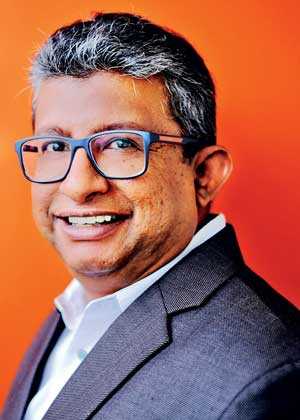Monday Feb 16, 2026
Monday Feb 16, 2026
Tuesday, 10 April 2018 00:00 - - {{hitsCtrl.values.hits}}
Sriganesh Lokanathan’s work with the Big Data team at LIRNEasia, an ICT policy think tank, has placed Sri Lanka in the spotlight on big data for development. Here, he talks to Daily FT about the potential and challenges that lie ahead.
Sriganesh Lokanathan co-established the Big Data research practice at LIRNEasia, a Colombo-based ICT policy think tank, in 2012. He was recently appointed to the Advisory Board of Citra Labs, Sri Lanka’s first social innovation hub, and presented his work with LIRNEasia at the United Nations’ 2018 ECOSOC Partnership Forum in New York on April 4.
“We take risks,” Lokanathan says. This explains how LIRNEasia first started working in big data in 2012. “We were seeing big data being used for development purposes in other parts of the world, and we wanted to see how we could use it in our context.”
Together with LIRNEasia founding Chair Prof. Rohan Samarajiva, Lokanathan negotiated access to pseudonymised, historical call detail records from multiple mobile operators in Sri Lanka. They began analysing this data to better understand communities based on actual communication patterns rather than administrative boundaries. In 2015-17 LIRNEasia extended the research to new data sources such as Close Circuit Television (CCTV), satellite imagery, electricity data, crowd-sourced data, as well as “small” data from government agencies and others. They also expanded into urban transport work, providing findings to the Western Region Megapolis Planning Project, and into modelling the spread of infectious deceases with the University of Moratuwa and the Epidemiology Unit of the Ministry of Health. They helped establish a data analytics lab at the University of Dhaka in Bangladesh.
In the span of half a decade, LIRNEasia has come to be recognised by the international data community as a pioneer in exploring and mainstreaming applications of big data for development in South Asia. In 2015 Samarajiva was appointed to the Data Privacy Advisory Group of United Nations Global Pulse, the big data innovation initiative of the UN Secretary General. In 2016, LIRNEasia CEO, Helani Galpaya, was appointed to the Board of the Global Partnership for Sustainable Development Data (GPSDD) alongside Deputy Secretary-General of the UN, Amina Mohammed.
LIRNEasia is also part of a Global South network on big data that supports capacity development among researchers in the region, with a focus on the Sustainable Development Goals. Through this network, LIRNEasia aims to provide critical perspective on big data issues such as marginalisation, privacy, bias, ethics and competition.
While there is considerable public discourse on each of these issues, the one Lokanathan prefers to engage on is marginalisation. “Whatever the application, we have to keep in mind that people have been left out of the data,” he says. In the case of the mobile phone data example, there are still significant portions of the South Asian population that do not own mobile phones. A recent nationally representative survey conducted by LIRNEasia revealed that 43% of Pakistan population aged 15-65 does not own a mobile phone. “We need to understand how the data is created, to understand who is missing,” Lokanathan says. “We need to be discerning in how we approach externally-provided data that comes out of a process that we know nothing about.”
Big data was a “complete unknown” to Lokanathan when LIRNEasia made the decision to explore the possibilities of big data for development in South Asia. At the time, he was working on information and knowledge problems in agricultural value chains in the region, and how technology could address these issues. “There was no natural trajectory,” in the change from agriculture to big data, he points out, but it seemed a suitable confluence of his background in computer science and public policy.
“If the argument is that we need better data for public policy, then the public sector needs data about everyone,” he says. “Traditional government sources [i.e., the census] don’t have the kind of data we need. We must start by broadening the horizon and asking where is the data that we can leverage to understand our citizens better.”
Public-private-partnerships now become key. “What we need is partnerships around data, which is not something people think about when you say public-private partnerships,” Lokanathan says. The Open Data movement spearheads the drive to make government information freely available so that the private sector can make well-informed decisions on product and service design. “On the flip side, we now need private sector data to complement what government is doing,” he points out. The work has to be carried out with care, not only for privacy concerns, but also in the interest of protecting competitive advantage in the private sector. “We need to think about how we can share data in a safe manner, about bounded research ideas, about sandboxing so that we understand what the problems are. Because we won’t know what the problems are, until we try.”
“The important thing to remember is that big data is not a replacement for the traditional statistics. It is a good diagnostic tool that gives direction to the traditional data.”